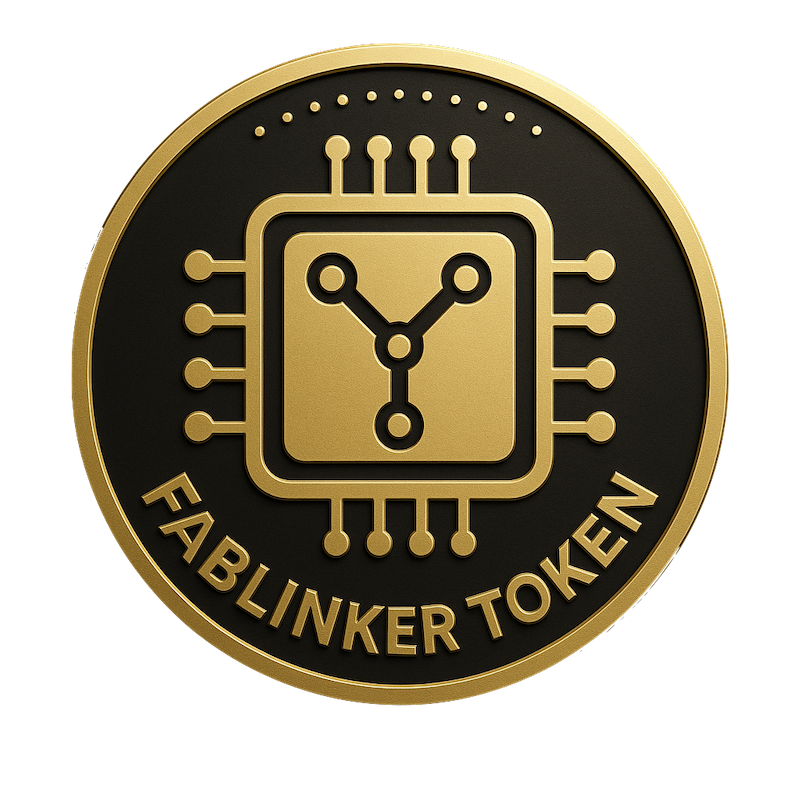
FABLINKER
TOKEN WHITEPAPER
PROJECT OVERVIEW

FabLinker Token is a functional cryptocurrency representing the right to manufacture AI chips. It is initiated by the FabLinker Token DAO. The project aims to build a new decentralized production capacity marketplace by combining production tokenization, on-chain verification, and decentralized governance.
Today, global access to advanced manufacturing nodes (like 5nm/7nm) is highly concentrated. Ordinary AI startups and developers face significant barriers in accessing top-tier chip production. FabLinker Token solves this by bridging the gap between supply (foundries) and demand (developers) through tokenization. Each unit of FabLinker Token corresponds to a right to reserve a certain quantity or time of chip manufacturing, enforceable through smart contracts.
The goal is to break the inefficient and exclusive capacity model and build an open, flexible, and globally accessible ecosystem for chip production.

Market Background & Industry Challenges
The global demand for AI chips is rising rapidly, driven by AI models, edge computing, and smart devices. However, AI chip fabrication relies heavily on advanced foundry nodes (e.g., TSMC’s 5nm or 3nm). This leads to several structural challenges:
- Production concentration: Advanced nodes are monopolized by a few foundries.
- Centralized access: Only large clients can secure capacity.
- Opacity: Pricing and scheduling lack transparency.
- Non-tradability: Production reservations are non-transferable and illiquid.
This makes it nearly impossible for smaller AI startups, research labs, and open-source chip projects to access resources. Meanwhile, foundries also face inefficient scheduling and limited fundraising flexibility.
FabLinker Token addresses these issues by creating a market for “tokenized capacity rights” that can circulate and be traded globally.
Core Value Proposition
FabLinker Token turns real-world chip manufacturing capability into a programmable, tradable, and governable digital asset. Its core value lies in:
Digital assetization
Converts production rights into divisible and transferable tokens.
Breaking the monopoly
Enables small firms to access production without large contracts.
Global liquidity
Token-based scheduling and resale of production rights.
Innovative fundraising
Foundries can tokenize future capacity to raise capital.
Decentralized governance
Users vote on foundry partnerships, pricing policies, and capacity distribution.
Smart contract automation
Scheduling, priority assignment, and settlement are handled via contracts.
Composable ecosystem
SDK/API integrations with EDA tools, chip design platforms, and supply chain systems.
Technical Architecture
Built on an EVM-compatible chain, FabLinker Token supports Layer 2 scalability and cross-chain operability. Key components:
Capacity Mapping Contract
Verified foundries map their capacity on-chain. Each issuance is tied to real-world factory data and represented as NFTs.
Capacity Booking Contract
Users stake FabLinker Token tokens to reserve manufacturing time or chip batches, with automatic scheduling and priority assignment.
DAO Governance Contract
All major decisions (e.g., new partners, capacity release, policy changes) are determined via token-holder voting.
Staking & Burn Mechanism
Token holders earn governance points and platform rewards via staking. Part of the tokens are burned during usage to ensure deflation.
Oracle & API Integration
Real-time syncing with ERP/MES systems ensures transparency of orders and production schedules.
Tokenomics
FabLinker Token powers the ecosystem through four roles: capacity rights, governance, usage, and incentives.
Total Supply :
1 billion tokens
(fixed, no further issuance)

Allocation :
35% – Capacity Providers (Foundries)
25% – Community & Developer Incentives
20% –Foundation Strategic Reserve
10% –Core Team (vesting)
10% –Investors & Strategic Partners
Allocation :
- A portion of FabLinker Token is burned with each booking.
- DAO Treasury uses collected fees for buyback and redistribution.
- Governance proposals can adjust burn rates.
Capacity Anchoring Mechanism
To ensure the token is backed by real value, FabLinker Token employs strict capacity mapping procedures:
Verified Off-Chain Capacity
Partner foundries submit authentic production schedules and audit reports.
NFT + Token Hybrid
Each unit of production is represented by an NFT and linked to the FabLinker Token token.
Third-Party Audit
Independent auditors validate capacity data and contract fulfillment.
Default Protection
In case of delivery failure, users may file DAO proposals for compensation from the reserve pool.
Data On-Chain Synchronization
MES/ERP data from factories is synced to the blockchain for verifiability.
Ecosystem & Platform Infrastructure
FabLinker Token’s goal is to become the backbone of a decentralized chip production ecosystem:
FabLinker Token DEX
A decentralized platform for token trading, capacity reservation, and resale.
Capacity NFT Marketplace
Reserved capacity can be tokenized into NFTs and sold on-chain.
Audit & Oracle Systems
Interfaces provide transparency of real-time data from partner foundries.
SDK/API Developer Kit
Chip design platforms and EDA tools can integrate FabLinker Token booking systems.
Governance Interface
Token holders vote on policies, fee structures, and partner integrations.
Cross-Chain Bridge
Interoperability with assets like ETH, USDT, and other RWA token ecosystems.
Roadmap
Q3 2025
Whitepaper release, core team formation, DAO framework & contract testing
Q3 2025
Whitepaper release, core team formation, DAO framework & contract testing
Q4 2025
Testnet launch, first foundry partnership, NFT capacity system deployed
Q1 2026
Mainnet launch, staking incentives, on-chain booking live
Q2 2026
DEX & NFT market launch, cross-chain bridge integration
Q4 2026
Expansion of global foundry partnerships in Asia & North America
2027+
Full global decentralized AI chip production network established
Team & Partners
Core Members:
Alex Huang
Founder & Strategy Director (ex-Samsung Foundry)
Leo Zhang
Chief Architect (ex-Ethereum L2 developer)
Ivy Chen
Web3 Ecosystem Lead (ex-Polygon Asia)
Ethan Wang
Supply Chain Advisor (PhD, SCM expert)
Partners
TechFoundry Asia
Strategic foundry connector
XAudit Labs
Smart contract audit partner
DePIN Alliance
Real-world oracle and data verification service
Compliance & Risk Management
Legal Structure:
FabLinker Token DAO registered in the Cayman Islands
Singapore-based foundation for R&D operations under regulatory sandbox

Risk Controls:
Capacity default covered by DAO arbitration and reserve pool
Price volatility mitigated via staking rewards and deflation
Smart contracts audited and monitored via bounty program
Regulatory adaptation ensured via legal advisory board
DAO & Community Governance
Governance Model:
All FabLinker Token holders can vote
Voting weight = token amount × holding duration × activity score
Proposal categories include: daily ops, capacity allocation, incentive models, partner approvals
Community Incentives:
RIP (FabLinker Token Improvement Proposals)
allow any member to submit and vote on changes
Content Rewards
for writers and analysts
Dev Grants
for tool builders and integrations
Referral Programs
for onboarding new developers and users